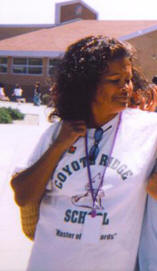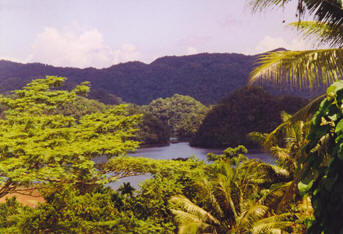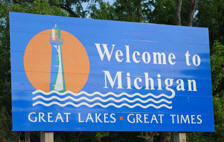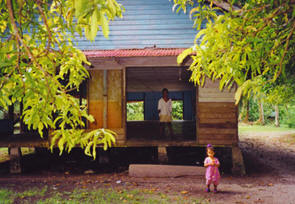
- My Home Page
- My Bio
- Family Object
- Agency Report
- Nogales Report
- Country Poster
- City Migrants
- Crossing the Valley
- Open Letter
From an Island in Palau
Ponciana Rafael is a coworker of mine at an Elementary school in Glendale. Over the past two years, I heard snippets of her stories from Palau, but I was never able to sit and chat with her. This project gave me the opportunity to do so. I spent a Saturday afternoon at Ponciana's home sharing a few "drinks" and enjoying her wonderful stories of Palau and how she migrated to the United States. The following testimony is from an interview conducted on April 30th, 2005. For a full copy of this transcript and recording, please e-mail me.


My name is
Ponciana Rafael. I was born and raised for the first
fourteen years of my life in Angar, Palau which is the
smallest island of Palau. And, at age fourteen, after
eighth grade I traveled to United States bringing my two
nephews and a niece. And, we left Palau September 1, and
we made our way to Yap.  We stop at Yap and then from
Yap to Guam. When we got to Guam, we got detained for
two weeks because we didnít have passport and Ö. Due to
the fact that I didnít speak a word of English, I
understood, but didnít speak. I had a sister that was
going to the University of Guam at the time and sheís
the one that came and pick us up at the airport. And,
because we didnít have our passport, they went through
all my stuff. They opened all the suitcase, boxes, they
took my purse, dumped it out, scared the life out of me.
Not to mention the three little kids that were with me.
And my sister was screaming to let her come and
translate for them because, you know, they were scaring
me. And, they wouldnít let her. And, finally they let
her Ö they released me and my niece and my nephews and
we went with my sister. But, we had to stay with her at
all time while we were there. We couldnít even go visit
my other sister. Cause, were you live in Guam in
Military air force. And so theyíre very strict about
when you coming there and you donít the right document
or right paper work. They tend to come over to the house
unexpectedly and check on you. Make sure youíre not
trying to sneak in the country, without permission. We
lived on the base anyway. It wasnít hard for them to
find me or come and check on us. After two weeks finally
our passports showed up. So then we traveled to Hawaii
and from Hawaii we went to Los Angeles and from there to
Michigan. And all along the way all I had to explain
where I was going was three by five piece of card that
said who was, where I was going and please help me get
to my next flight. And, thatís how I traveled from Palau
to United States. With that little three by five card.
We stop at Yap and then from
Yap to Guam. When we got to Guam, we got detained for
two weeks because we didnít have passport and Ö. Due to
the fact that I didnít speak a word of English, I
understood, but didnít speak. I had a sister that was
going to the University of Guam at the time and sheís
the one that came and pick us up at the airport. And,
because we didnít have our passport, they went through
all my stuff. They opened all the suitcase, boxes, they
took my purse, dumped it out, scared the life out of me.
Not to mention the three little kids that were with me.
And my sister was screaming to let her come and
translate for them because, you know, they were scaring
me. And, they wouldnít let her. And, finally they let
her Ö they released me and my niece and my nephews and
we went with my sister. But, we had to stay with her at
all time while we were there. We couldnít even go visit
my other sister. Cause, were you live in Guam in
Military air force. And so theyíre very strict about
when you coming there and you donít the right document
or right paper work. They tend to come over to the house
unexpectedly and check on you. Make sure youíre not
trying to sneak in the country, without permission. We
lived on the base anyway. It wasnít hard for them to
find me or come and check on us. After two weeks finally
our passports showed up. So then we traveled to Hawaii
and from Hawaii we went to Los Angeles and from there to
Michigan. And all along the way all I had to explain
where I was going was three by five piece of card that
said who was, where I was going and please help me get
to my next flight. And, thatís how I traveled from Palau
to United States. With that little three by five card.

ďIf I left here, I would miss my oven. I would miss my microwave. I would miss constant running water. The showers. The warm showers... I would miss my friends the most.Ē
When you travel from Palau to Hawaii you get out, youíre outside. K, and they bus you to the terminal or the customs or something, where they go through your stuff. But, once I got to LA it was inside the building. And, they were nothing but a bunch of white people. Not to sound racist, but, Iíve never been a place where there were a lot of people that blonde, blue eyes, you know. Different color of hair, different height, even tall women. Iíve never seen tall women. And women are taller than men. And I was just in awe of TVís surrounding you. Iíve never seen a TV. So, to see the monitors Ö now, I know theyíre monitors, but back then I thought they were TVís. Wow, we can watch movie, you know, while weíre walking. This was pretty cool. But, I was you know Ö they keep telling me walk this way, walk this way, you know, you gotta go this way. And thatís when I knew I was in Ö and Iím like we landed inside, instead of outside. Is there and outside to this place? Am I gonna get lost? Or end up somewhere and theyíre gonna ship me off to another place. And all I could do was, ďI hope my sister shows up soon.Ē And then some tall man came and asked well you have eight hour layover. I knew what that meant because my brother in law had called and told me if they ask you if you wanna to stay for layover, say ďno.Ē And thatís the only word I needed to know. ďYesĒ or ďnoĒ.
It was
scary, because for one, I didnít speak English and two;
I was just a kid myself. I was only fourteen. I was
straight out of eight grade. And, Iím traveling across
Pacific Ocean to another country Iíve never been to with
three little kids with me. Was not dressed properly
because it was already cold in Michigan. We had no
winter clothes. Had sandals and shorts and t-shirt. And,
I Ö first time I ever felt what it was like to be in
cold weather. And, it was already cold. It was like,
forty degrees when we landed. And, I thought I had
landed in ice box. And, I asked my sister at the
airport, ďAre we in a ice box?Ē She said, ďNo youíre at
the airport, the terminal. Itís cold here.Ē I said,
ďOh.Ē
across
Pacific Ocean to another country Iíve never been to with
three little kids with me. Was not dressed properly
because it was already cold in Michigan. We had no
winter clothes. Had sandals and shorts and t-shirt. And,
I Ö first time I ever felt what it was like to be in
cold weather. And, it was already cold. It was like,
forty degrees when we landed. And, I thought I had
landed in ice box. And, I asked my sister at the
airport, ďAre we in a ice box?Ē She said, ďNo youíre at
the airport, the terminal. Itís cold here.Ē I said,
ďOh.Ē
Families back there is very big. A lot of times the older kids, and I, been pulled out of school to help the parents raise the little ones. For example, my whole family Ö we had fifteen. Thereís fifteen of us. Two of from my dadís first marriage. Which my sisters never claim. I claim them all, because theyíre both Ö even though theyíre half brother and sister; theyíre still my brother and sister. But, growing you know all my nieces and nephews. My sister moved away, left them behind. I took care of them and went to school myself. And a lot of them were my own age, but. But, thatís how it was when my sister was growing up. They got pulled out school to work in the gardens and gather whatever. We didnít have stores or hospital or anything like that, so. A lot of food you had to go and find it. Itís there, around the house. Thereís vegetables and stuff growing everywhere. You just had to go pick it, or dig it up or go hunt for it, or fish it out of water. But, your parents canít do that for all the kids are at home. So, a lot of times the siblings had to pitch in and do that work and thatís how you got pulled out of school. I consider myself lucky that I made it all the way through high school. I guess thatís what my mom wanted me to do. Thatís why she send me here. And another thing a lot of girls get pregnant right out of eighth grade and have kids.
ďBats, for instance, are one of my favorite food.Ē
Think you know people from the island have it easy and itís beautiful. Yeah, itís a beautiful place to live but the stress of raising kids and not having enough food sometimes, but you really donít need money unless you drink, or smoke, or drink coffee. And, thatís pretty much what you need money for. Otherwise, everything is grown right there on the island. If you know whatís edible then you will never starve but, if you depend on that stuff then you need money. My dad only made thirty dollars a month fishing, on a fishing boat.

You know, back home weíre all same color. My dad always taught us that we all bled the same color blood. Growing up we used to be drilled that all the time. It didnít matter what color outside.... cause we had Japanese people come down. They looked different. But, we didnít look at them that way. And, Americans, black ... soldiers that came. So, my dad taught us never to look at people. So, in high school I used to hear this ... I was the only colored ... thatís another thing. I was the only dark skinned person in that whole entire high school. And, didnít even know it. Cause, I had a lot of friends that treated for who I am, not the color of my skin. But, then there were lot of kids that, you know, ďThat black, that negro girl ... that little girl, I heard my be little, but sheíll kick your ass and tear you up and blah, blah, blah,Ē And, Iím like, who they talking? Whoís the nigger girl? And, my friends would laugh because they knew they were talking about me. And they go, ďOh, donít worry about it.Ē
"The life over there so
simple you know how to survive on island. You can
build fire anywhere.  You could cook anything. Thereís
food everywhere.Ē
You could cook anything. Thereís
food everywhere.Ē
I got a lot of discrimination
from teachers; my math teacher especially. Cause, high
school back east, you know, they still have those
heating systems in the wall. Itís no central heating.
And, so you have to go to your class in your jackets. It
was just cold. And he would make me take my jacket off
and throw it out the window. And, then after his class I
would have to go out and get it. He told me I wasnít
allowed to wear jacket in his class. And then everyday
if, all I had to is turn my head and heíd make me sit
under the ping pong table in the back of the room and if
I couldnít see the words that was my problem. But, I
didnít know I could tell my brother all that and my
sister. I thought it that it was just the way Americans
treated students if we were bad. I didnít know I was
bad. I couldíve been warned. ďDonít turn your head, you
know, youíre supposed to be looking at the board.Ē But,
didnít matter what I did. And, I got stuck with that
same teacher. His name is Mr. Stevens. I even know where
his house. What town he lived in. I never forget his
name. And then when my nieces and nephews that I brought
here to the state went through him, they went through
the same thing. But, they were smart enough to say
something about it. I didnít. I didnít know about it.
And, they used to say you know donít date this, they
called the black guys the ďnĒ word, they said because
theyíll rape you and throw you in a ditch. Well, I
didnít know what that word meant.  Different
color than what Iíve seen. Cause, in that town there was
no black people living there. That town is very all
white. But, I didnít feel any prejudice. I didnít
realize I was being treated that way until I left and
then hear my nieces and nephews tell me about. Cause,
when I came here to Arizona When I graduate in 1976.
That was like, um, what is that ... whatís the
significant of that year? Bicentennial. Mmhmm. That
year. When the first time I really got a harsh reality
of what racism is all about. Because you know, itís
so... diversity. You know, you got Mexicans, you got
black and theyíre all right here. Where over there I
didnít see any. I didnít consider myself dark. I thought
I was just (inaudible) but, thatís how they treated me,
and not just my math teacher, a few other teachers. But
it was cool. I survived it. I made it through.
Different
color than what Iíve seen. Cause, in that town there was
no black people living there. That town is very all
white. But, I didnít feel any prejudice. I didnít
realize I was being treated that way until I left and
then hear my nieces and nephews tell me about. Cause,
when I came here to Arizona When I graduate in 1976.
That was like, um, what is that ... whatís the
significant of that year? Bicentennial. Mmhmm. That
year. When the first time I really got a harsh reality
of what racism is all about. Because you know, itís
so... diversity. You know, you got Mexicans, you got
black and theyíre all right here. Where over there I
didnít see any. I didnít consider myself dark. I thought
I was just (inaudible) but, thatís how they treated me,
and not just my math teacher, a few other teachers. But
it was cool. I survived it. I made it through.
MM 05/11/05